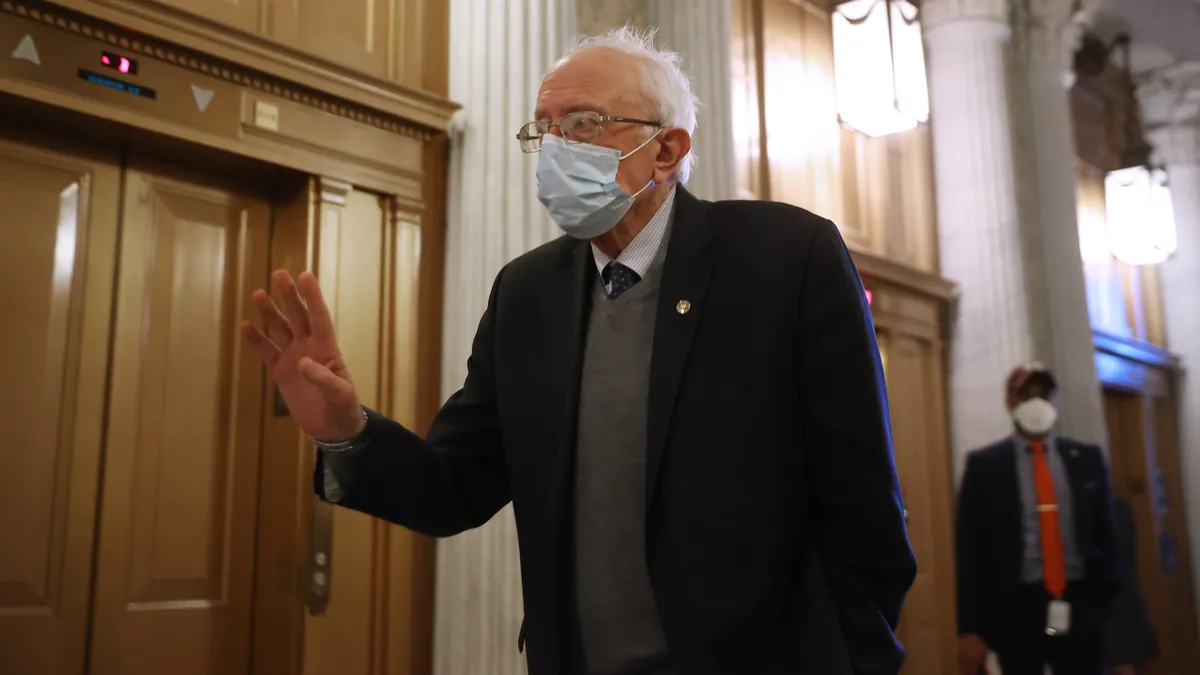Dive Brief:
- Federal legislation introduced Wednesday would make community college tuition free for all students, and four-year public and private minority-serving colleges tuition free for those whose families earn less than $125,000 a year.
- The College for All Act, from Sen. Bernie Sanders, I-Vt., and Rep. Pramila Jayapal, D-Wash., also would double the maximum Pell Grant award to $12,990 for the next academic year. Lawmakers have introduced versions of the legislation in prior years.
- The measures reflect many of President Joe Biden's campaign proposals, but they face a divided Congress.
Dive Insight:
The latest bill would bring federal support to an existing network of state and local free college initiatives. States would be encouraged to "sustain and expand" these offerings, according to a bill summary. More than 360 such programs exist across the country, including 31 statewide programs, according to advocacy group College Promise.
A tax on certain Wall Street activity would help fund the expansion. The federal government would pay 75% of the cost of providing free tuition at public institutions, with states covering the remainder. Its share would grow to 90% during an economic downturn.
That mechanism appears to respond to concerns states wouldn't be able to cover their costs.
"To make this a sustainable program, that has to happen," said Wesley Whistle, senior adviser for policy and strategy at New America, a left-leaning think tank.
Biden ran on the idea of making community college, and public four-year colleges for families earning less than $125,000, tuition free. He also pledged to fund MSIs with the "equivalent to up to two years of tuition per low-income and middle class student," according to his campaign website.
Free community college is "maybe the minimum or the frontline piece that would move," said Michele Streeter, a senior policy analyst at The Institute for College Access and Success, which has advocated for a federal-state partnership for funding public education. But the inclusion of four-year colleges reflects how that conversation has expanded in recent years, Streeter added.
The bill sponsors also want to double the maximum value of the Pell Grant, which Biden called for on the campaign trail and more than 1,000 education groups have thrown their support behind. Their legislation would not apply the increase to funds used at for-profit colleges, however. The called-for change far exceeds the $400 increase to the Pell Grant that Biden included in his annual budget request for the Education Department.
The bill would also provide $10 billion to public and private nonprofit MSIs and "under-funded" public institutions to improve academic support and mental health counseling, in tune with a similar campaign proposal.
But the proposed legislation, and Biden's spending plan, face a divided Congress in which Democrats hold a slim majority. Additionally, some efforts to expand access to two-year schools could draw resistance from four-year colleges, Politico reported this week.
Jonathan Fansmith, director of government relations at the American Council on Education, doesn't expect the bill will gain much support among Republicans. But Fansmith doesn't think the timing of its introduction is accidental, given that it comes as Congress weighs massive spending requests.
"It is a bold proposal, it is a big proposal, it is a clear statement of priorities," Fansmith said. "Even if you do not see all of the elements of it ultimately adopted into law, it's very clear that parts of this are going to be considered very seriously and likely considered very seriously in the immediate future."















